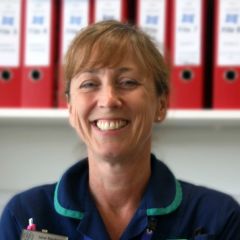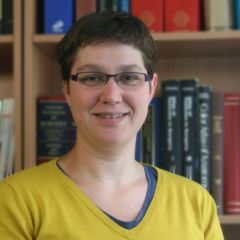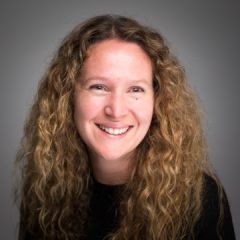More spotlight profiles
We talked to Jane Niederer, the Lead Research Nurse for the Surgical Research Team.
 You lead a team of research nurses as part of the Surgical Oncology Research Group. Tell us a little about the work that you do.
You lead a team of research nurses as part of the Surgical Oncology Research Group. Tell us a little about the work that you do.
I am lucky enough to work with a wonderfully enthusiastic team of nurses. We work on a variety of surgical clinical trials across tumour sites, involved with trialling new surgical techniques or procedures versus standard treatments in RCT’s (Randomised Controlled Trials). We also recruit to the cancer arm of the 100,000 Genomes Project. Oxford is one of 13 Genomic Medicine Centres across the UK engaged in improving patient outcomes by personalising treatment using this new technology. The team also recruit to the Oxford Radcliffe Biobank, providing a valuable resource for local researchers.
What are the challenges of your role?
Research is not yet part of the defined patient pathway and, as such, we are often seen begging for rooms in busy clinics and having to be very resourceful when it comes to finding spaces to discuss and consent patients to trials and projects. I am lucky to be part of a very tenacious team!
The challenges are far out weighed by the infinite variety of the work and the diversity of the people we have the privilege to work with within the wider MDT’s (multidisciplinary team) and the patients.
Academic research is a growing career pathway for nurses. Why did you move into research?
I was a Urology Clinical Nurse Specialist prior to becoming a research nurse, working with Head of Department Professor Freddie Hamdy. Professor Hamdy was involved with various urology research projects and I found his enthusiasm for research to be contagious. I think that was my inspiration for a move to research!
Personal development is important to you, and you encourage the members of your team to actively pursue their own personal learning journey as well. Tell us a little about the additional training/courses you have completed and are currently undertaking?
I have completed a Postgraduate Certificate in Leadership in Health and Social Care while in this role, and intend to continue working towards a Master’s qualification. I completed the Planning and Managing Clinical Trials module shortly after starting in my current post and found this course really underpinned the work I am involved in. This year I have applied for the introduction to Genomics module at Birmingham University. I am grateful to the NDS for their support and flexibility, which has facilitated my continued professional development and encouraged me to pursue these opportunities.
The Outreach Working Group formed in 2015 in which you are the co-chair. What made you decide to get involved in public engagement, and which event have you enjoyed the most and why?
Outreach is a delightful area to be involved in, interacting with local schools and the public is fabulous fun. I am passionate about equal opportunities, so relish the chance to interact with students and the public to help raise awareness about the great opportunities for careers in surgical science.
I think suturing bananas with young people was one of the most memorable outreach activities I have ever undertaken. I still have nightmares!
You switched from a standard five-day week to working full-time over a four-day week. How does this flexible working arrangement benefit your work/life balance?
The flexible working arrangement I have allows me to travel quite a distance from a very rural home I love to work and back relatively unhindered by rush hour traffic. I have an extra day off in the week so I can spend time with my daughter who is currently studying for her A-levels. The flexibility of my working week is a real privilege and works really well for our family.
We talked to Jo Snoeck, the Departmental Administrator.
 You started working in the department in January 2013, first as a recruitment coordinator with Professor Alison Halliday in the Asymptomatic Carotid Surgery Trial (ACST-2) and later as a research coordinator with the Head of Department Professor Freddie Hamdy. What attracted you to the position of Departmental Administrator?
You started working in the department in January 2013, first as a recruitment coordinator with Professor Alison Halliday in the Asymptomatic Carotid Surgery Trial (ACST-2) and later as a research coordinator with the Head of Department Professor Freddie Hamdy. What attracted you to the position of Departmental Administrator?
After I made the decision to change gears and move away from pure research, I didn’t feel that the world of Industry would suit me. Naturally, clinical trials and research administration seemed the logical choice for me, as these roles are embedded in a university research environment. I always knew that at some point, I would take the next step from project management to a more people management focused role. When the position became available in the department, I felt it was a great opportunity for me so I applied. The DA role is so pivotal, being involved in all key areas in the administration of a university department. I really felt that my previous experience in the department “on the other side”, my experiences in other universities, and having been a researcher myself, would really help me to dive into the role. The main attraction for me was the opportunity to help grow and shape the department in all its aspects and continue the positive way forward on the foundations of my predecessors.
What do you hope to achieve in this position?
I hope to contribute positively to NDS and support the department and all staff members to reach their full potential. I am here to serve the department and do everything I can to make this a fantastic place to work, so that great things can happen in NDS! I see many great opportunities for the department, and I would like to focus on forging closer links with all our partners (Medical Sciences Division, Oxford University Hospitals and other departments), making a lasting cultural change in the department (resulting in improved equal opportunities and wellbeing for all staff), increasing collaboration and multidisciplinary research (leading to innovation, translation and attraction of new research funding), and more efficient and streamlined support.
You recently graduated from the Saïd Business School with a Diploma in Strategy and Innovation. Tell us a little bit about the journey you undertook to get your diploma and how it is benefiting your career?
The course has been a real rollercoaster. As a researcher, business speak was very alien to me, and it took me a while to learn the vocabulary. Having to attend lessons, studying, taking exams, writing papers, it’s all been a while but I got my brain in a higher gear and actually really enjoyed it. It has truly been a great experience from the discussions in class, our study group, the fantastic people I met, and even the exams and the dissertation. The course has allowed me to think differently, understand new concepts and how to implement them and most of all, it has given me the confidence to do new things and embrace challenges! And of course the amazing food at the business school, an affiliation to Oriel College and the graduation ceremony in the Sheldonian were an added bonus!
As a mother of three children, how do you balance work, study and family life?
You just make it work really, it’s not so much a balancing act, but a constant juggling. Studying at the breakfast table, being questioned about innovation by a 6 year old over porridge, having a fantastic supportive and flexible family, nipping out of work to go to my son’s play in school or getting some work done on Saturday morning in PJ’s with a coffee after dropping of my oldest one at swim training. My husband says it quite nicely on his website, “working hours are between waking up in the morning, and going to bed in the evening”, and that seems to work quite well for us individually, and for the family as a whole. Another secret is, you need to be a bit disorganised so you don’t have to worry about having to change plans, as most of the time there is no plan; you just get on with whatever needs to be done.
You are a member of a parent science network in a local primary school. What does this involve and why do you feel it is important to take outreach activities in to schools?
The Parent Science Network is a group of parent-scientists who want to bring real life hands-on science into school, and get the next generation of potential scientists interested and engaged from a young age. Research is quite often done in a silo, and there’s a tendency to get caught up in the details of your research. People easily forget how they got into science. It all starts with being curious, and who are the most curious people on the planet? Children of course. They all have an inquisitive mind, and are so interested in how things work. We gave a workshop on microbes last year, and the level of engagement and really clever questions from Year 2 children is absolutely fantastic! It’s a great way to get involved in the school community, bringing something a bit special to the school and engaging children who might otherwise not have the opportunity to do hands-on science.
We talked to Emma Morris, who was a researcher in the Bone Oncology Research Group.
 After obtaining a first class honours degree from the Open University in 2008, you joined the Nuffield Department of Surgical Sciences where you graduated with a DPhil in 2013. How did you find the transition from being a DPhil candidate to becoming a researcher within the department?
After obtaining a first class honours degree from the Open University in 2008, you joined the Nuffield Department of Surgical Sciences where you graduated with a DPhil in 2013. How did you find the transition from being a DPhil candidate to becoming a researcher within the department?
It was an easy transition as I was already familiar with the department.
Tell us a little about the work that you do in Claire Edwards’s lab.
I work on the cross-talk between multiple myeloma and the bone microenvironment with a particular interest in bone marrow adiposity.
What do you enjoy about being a research scientist?
I enjoy the freedom to be creative and free thinking, to be able to think of my own ideas and design ways to prove or disprove them. Like many scientists, I enjoy putting small pieces of the puzzle together and moving forward to contemplate how to find and fit the next piece. Working on a question that no one has yet to answer, makes the job challenging but enjoyable.
As a mother of three children, how do you balance work and home life?
I find it challenging at times. I’m not sure that you can ever find a true balance when working full-time in a demanding role. However, I have a very supportive family and so between us we make it work. It is a definite team effort.
The Outreach Working Group formed in 2015 in which you are the co-chair. What have been the group’s successes so far and what are you hoping to achieve in the future?
We have run a number of successful outreach events including school visits and career events. We are currently working on implementing a more structured work experience programme to offer a number of summer placements within the department. We are also collating the public engagement activities across the department so we can identify any support or training that could be offered to encourage more members of staff to be involved in the future.
You are coordinating the NDS booth at this year’s Oxfordshire Science Festival. What are you hoping to learn from participating in the festival?
The mutual benefit of science communication to the wider population is becoming more apparent, with many funding bodies now expecting a level of public engagement to be incorporated within grant applications. Increasing public understanding of scientific issues and engaging with the public to strengthen the case for increased support for science can only have a positive outcome for both the department and the university as a whole. I am therefore hoping that the Oxfordshire Science Festival will give members of the department the opportunity to not only showcase their research, but also learn more about how best to communicate their research topics to the public.

